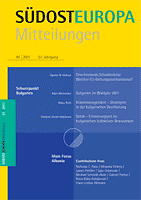Why Are Albanian Elections so Controversial?
Why Are Albanian Elections so Controversial?
Author(s): Gabriel PartosSubject(s): Politics / Political Sciences
Published by: Südosteuropa Gesellschaft e.V.
Summary/Abstract: Twenty years after the start of Albania's transition from totalitarian communist rule to a multi-party political system, Albanian democracy remains riddled with shortcomings. The conduct of elections, in particular, has remained highly controversial, with the losing side frequently disputing the results. The brief article seeks to provide a few tentative answers as to why election outcomes are so fiercely contested in Albania. Among the reasons suggested for this state of affairs is the survival of a Stalinist regime until the eve of the first multi-party elections in 1990, without any process of limited “liberalisation”, as experienced elsewhere in Eastern Europe. This, in turn, led to serious failings in the early post-communist elections, which gave rise to a legacy of intense mutual suspicions between rival political parties. These suspicions have become ingrained, outlasting the improvements in the technical conduct of elections. Besides, as in many other democracies, electoral success provides the winner with a wide network of patronage to dispense favours in return for material benefits. Furthermore, in Albania in some cases the leaders of defeated parties are required to stand for re-election by their parties; and electoral defeat often leads to a loss of trust invested in leaders by their supporters.
Journal: Südosteuropa Mitteilungen
- Issue Year: 2011
- Issue No: 01
- Page Range: 87-92
- Page Count: 6
- Content File-PDF

